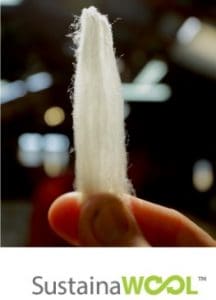 A MAJOR superfine wool contract has been offered to Australian growers for non-mulesed wool only for the first time.
A MAJOR superfine wool contract has been offered to Australian growers for non-mulesed wool only for the first time.
But the New England Wool contraqct on behalf of its Italian shareholders has precluded wool from sheep treated with the latest alternative to mulesing – the liquid nitrogen application called steining.
New England Wool, on behalf of its Italian shareholders, Reda and Vitale Barberis Canonico, has released an 800-bale contract as part of its Bring Back the Premium concept.
In a letter to potential suppliers, NEW managing Andrew Blanch said BBTP contract gives the grower the financial incentive to produce and prepare lines of spinner style, fine crimping wool by guaranteeing a premium for such wools.
“However, this particular contract, in response to the strong requests our shareholders are receiving from the final consumer for non-mulesed wool, will only be made available to the SustainaWOOL Green accredited wool producers.
“That is to say, only farms accredited under SustainaWOOL that have ceased, or never mulesed can enter this instalment of the BBTP Contract.”
For this particular contract, NEW has confirmed that wool coming from sheep that have undergone the alternative process of breach modification involving liquid nitrogen (called steining) will not be deemed as non-mulesed (NM) and the farm will not be deemed as having ceased mulesing (CM).
The contract is seeking sound 15.8-19.2 micron spinner style, fine crimping wool of spinning count 74s/80s with a length target of 75-80mm. Staple length, color and skirting requirements apply to different types.
Mr Blanch said the August-December 2019 period contract aims to support those growers who are growing the wool NEW shareholders most desire.
“In this time of global uncertainty and general weak market sentiment, Reda and VBC continue to support those wool producers who supply the best quality wool under the highest sustainability standards.”
Mr Blanch said the non-mulesed wool contract was REDA and Barberis trying to send a message to suppliers that this is where all their demand is coming from.
“We will still support people in the auction, but as far as this special contract, we are trying to send the message that this is the future, whether we like it or not.
“Our client’s clients are working towards a non-mulesed future.”
Mr Blanch said a number of REDA and Barberis’ clients are asking only for non-mulesed wool product and are willing to pay a premium for it.
“That’s what their social responsibility departments have said that they want – they want non-mulesed and also a scheme behind it, traceability in the story.”
Mr Blanch said the demand pressure for non-mulesed wool is also increasing from China.
“They export to a lot of those places as well, there is a lot of wool coming back into Italy from China.
“Their (China’s) own domestic market is not asking for it yet, but as they become more attuned to what is happening around the world, it will come at some stage,” he said.
“In the sale ring, you can see the Chinese have got certain premiums for non-mulesed lots, so it’s not just being driven from Europe, it’s coming from all over the world now.
“While ever we’ve got South Africa, New Zealand and South America all producing it (non-mulesed wool) and we know it’s not easy, but to the rest of the world that just means they will go elsewhere or Australia should be able to do it.”
But he said there is still a market understanding that pain relief represents a path toward breeding sheep for non-mulsed wool production.
“I still think pain relief is very, very important – it still should be there and we should be working toward the best pain relief outcome we can get for animals that you fairly can’t stop mulesing right now.”
A maximum of 800 bales in total pledges will be accepted for the NEW contract. Entry into the contract is on a “first in” basis. As soon as pledges reach 800 bales, the contract will be considered closed. Pledges to be received latest Tuesday 5pm 6 August 2019 or until the contract is fully subscribed.

HAVE YOUR SAY